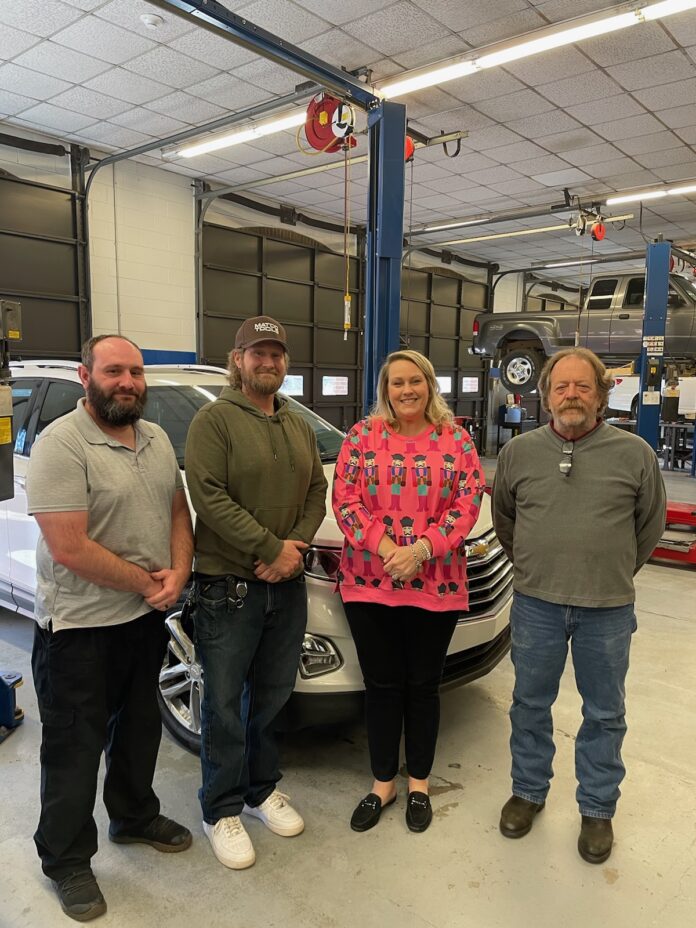A few years ago, Kyle Harris was enrolled in a program for at-risk veterans at the Veteran Life Center of North Carolina when he found out about educational and job training opportunities at Vance-Granville Community College.
As a military veteran — who faced PTSD, addiction, homelessness, and incarceration after his service — Harris was looking for a new start. Harris decided to learn more about Vance-Granville’s offerings, eventually enrolling in the college’s automotive systems technology program in 2022.
“It was just the very beginning of my journey,” Harris said.
Today, Harris is about to graduate with a bachelor’s degree, is a homeowner and working full-time with Southeastern Specialty Vehicles, and is helping mentor other veterans. And as of this month, Harris is also the recipient of a statewide award from the N.C. Community College System (NCCCS), the prestigious Dallas Herring Achievement Award.
Named in honor of Dr. Dallas Herring, known as the “father” of the NCCCS, this award is annually presented to a student who best embodies Herring’s philosophy of “taking people where they are and carrying them as far as they can go.”
“God has really blessed me, because college has been challenging,” said Harris, who is 43 years old. “I didn’t know if I was past the point of learning, but it was nice to know that somebody recognized where I was coming from, and how far I had made it, and that my journey was really challenging. It really feels good that somebody noticed that, and noticed that I’d overcome a lot and that I’m doing really good now.”
Notice: JavaScript is required for this content.
In North Carolina, more than 18,000 people are released from North Carolina adult correctional facilities each year, according to state data.
Navigating life after incarceration is difficult for many reasons. In addition to their criminal record and the resulting stigma, many people also struggle with food, transportation, child care, education, jobs, mental health and substance abuse, and finding housing. In fact, in 2023, about one in six people released from North Carolina prisons were experiencing homelessness.
Veterans are also at an increased risk of facing homelessness and incarceration, according to the Veteran Life Center’s website. There are more than 615,000 veterans living in North Carolina, according to 2023 data from Carolina Demography.
“It is our goal to provide each of our residents the prospect of a constructive and personally satisfying role in civil society,” the center’s website says. “By strengthening their mental fitness and physical health, improving life skills and providing vocational training, we will guide them to career opportunities and community reintegration, averting all-too-frequent crises such as homelessness, incarceration, suicide and premature death.”
Harris said educational opportunities like the ones afforded to him at both the center and Vance-Granville can really help disrupt this cycle.
“Sometimes when you’re homeless and you’re out on the streets, you feel invisible,” he said. “It feels good to be to be noticed for doing something good. …It’s really giving me a confidence that I haven’t had before. I take that into a lot of things in my life, like school and work.”
In recent years, North Carolina community colleges have increased efforts to serve veterans and justice-involved students. Education leaders say that meeting the needs of non-traditional adult learners from all backgrounds is an important part of both helping students and helping the state meet its postsecondary attainment goal.
At Vance-Granville, Harris said the college helped him navigate financial aid and the federal Pell Grant program, and also worked with his representative at the U.S. Department of Veteran Affairs (VA) to ensure his disability needs were met. While he was transitioning from the center’s residential program to living on his own in Henderson — where he eventually bought a house — Harris sometimes also used the campus food pantry.
“And just the fact that through the Automotive Systems degree program, I’ve met people in my field that live in Henderson,” he said. “It’s given me friends and new contacts in my new community, so that I could establish myself in my new community, away from all the trouble that I’d had in my previous hometown.”
James Gibbs, Vance-Granville’s head of transportation technologies, said he thinks Harris exemplifies the Dallas Herring award. He first met Kyle in spring 2022 but didn’t know about his background until later.
“Here in the last year, I have found out what he went through to get to where he is now,” Gibbs said. “He was basically at rock bottom.”
According to Gibbs, Harris had “practically no prior automotive experience” before he enrolled at the college. Now he’s a star student with a great sense of humor, Gibbs said, and is always willing to help other students and veterans who are in need.
“He has pulled himself up, and he’s got him a good job,” Gibbs said. “He just, he’s giving, and he’s a hard worker, and he just has good work and study ethics.”
Harris said he wouldn’t have made it this far without the many people, like Gibbs, who have helped him the last few years, so he strives to pay it forward. Specifically, he tries to tell other veterans about the value of sobriety and community college training.
“I want to make sure that if I see a chance to help another fellow veteran out, that I’m going to try to do the best I can for them, like someone did for me,” Harris said. “… Even though a person may get lost or fall down in life and things look pretty grim… one day they could turn it all around. And I hope that they do, if they choose the path I did, they’ll be able to turn it all around. If I could do it, anyone can do it.”
